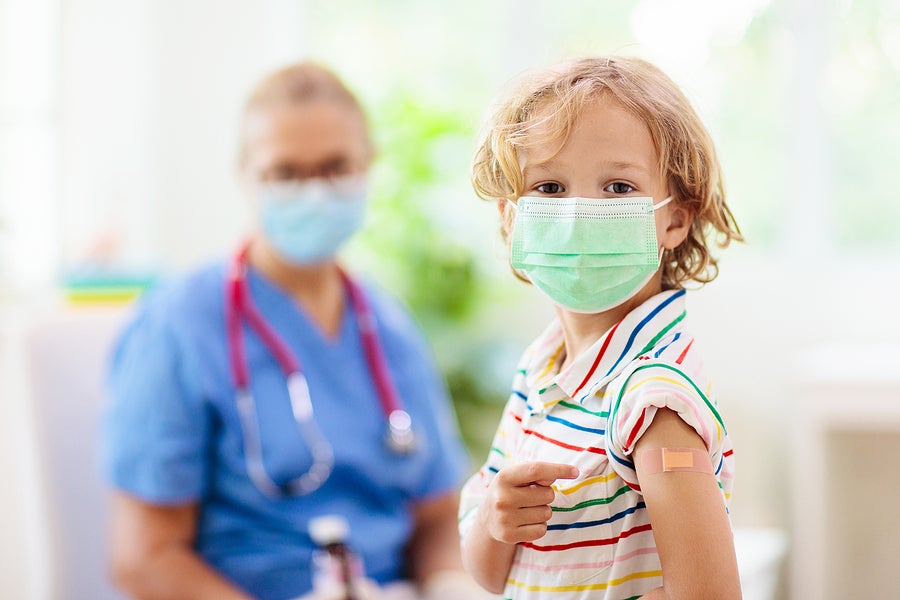Early Childhood
-
Urgent Action Needed to Catch Up on Routine Childhood Vaccinations
Introduction Vaccines are a safe and effective method of reducing the burden of infectious disease. On an individual level, they prevent severe illness, death, and long-term consequences of disease such as neurological disorders. On the community level, they forestall dangerous outbreaks of infectious disease and save money that would otherwise be spent on treating preventable…
-
California’s Medicaid Breakthrough: An Opportunity to Advance Children’s Social and Emotional Health
By Sarah Crow and Christina Altmayer Revamping Medicaid policies to improve young children’s social and emotional health and address health care inequities is particularly critical in California, where over half of children ages 0 to 5 have Medicaid coverage (known as Medi-Cal, in California), and two-thirds are children of color. California ranks near the bottom…
-
Limited Postpartum Medicaid Coverage Extensions are a Missed Opportunity
States are continuing to push for extending Medicaid coverage for postpartum women beyond the current federal cutoff of 60 days after the end of their pregnancy. Just in the last month, three more states submitted waiver applications to CMS: Indiana, Georgia, and Texas. Before the end of the year, we submitted comments on Indiana’s limited…
-
Survey Shows Single-Parent Households with Young Children Bear the Brunt of COVID-Related Stress
COVID-19 is affecting every part of family life, and for parents of young children the financial strain, emotional stress, and burden of care are especially overwhelming. We know that the emotional wellbeing of parents affects their children’s development, especially in the early years of life. In a recent report of a weekly survey to about…
-
State Leaders Advance Infant and Early Childhood Mental Health Policy, Part 2
Four years after launching ZERO TO THREE’s Infant and Early Childhood Mental Health Financing Policy Project (IECMH-FPP), we have learned a lot about opportunities to advance infant and early childhood mental health policies, even amidst a tough political climate and funding limitations. In an effort to highlight the remarkable accomplishments of IECMH-FPP states, we recently…
-
Medicaid Expansion Helped Close Coverage Gaps for Pregnant Women, New Study Finds
Medicaid expansion helped close coverage gaps for low-income women in the months before, during and after pregnancy, reducing the number of women who were uninsured during this critical time, new research published this month in Health Affairs found. The authors define “low-income” as a woman whose income is below 138% FPL, the eligibility limit for…
-
As Families Grapple with Schooling Stresses, Congress Must Act
Community Catalyst By: Eva Marie Stahl The Senate is on vacation until next week, having left Washington last month without delivering on the needed support that states and localities urgently require to support families and working people across the country who are living on the edge of financial and health disaster… In a recent survey,…
-
New Report Underscores Urgent Need for Better Prenatal Health Care in Rural Areas
Earlier this summer, we called attention to the challenges that women in rural communities face during pregnancy and the postpartum period, and new research from Child Trends shows those challenges and health disparities extend to their young children as well. “Health Care Access for Infants and Toddlers in Rural Areas” found that rural infant and…
-
Families with Young Children Need More Support During COVID-19, Surveys Show
Since April, the researchers at University of Oregon’s Center for Translational Neuroscience have been conducting a weekly national survey of households with children age 5 and under and the findings are clear: families with young children are stressed, and they’re increasingly facing hunger and unemployment. These challenges, the authors write, are, “negatively affecting caregiver well-being,…
-
At Hug Me Tight, no more hugs for now: The challenges of child care in the age of COVID-19
Pittsburgh Post-Gazette By: Kate Giammarise For the first time in months, young children toddled through the door at Hug Me Tight Childlife Center on Monday. They faced a few changes. Two-year-old Titan Yates arrived around 8:30 a.m. His mother Ty logged him into the center’s computer system by using her phone to scan a QR…
-
Rural Disparities, Racial Disparities, and Maternal Health Crisis Call Out for Solutions
Maternal health access and care were already in crisis before COVID-19, and the pandemic has further laid bare the racial and geographic disparities experienced by pregnant women and new mothers across the country. Last month we submitted comments in response to CMS’s request for information on improving access and quality of maternal health in rural…
-
Opportunities for Supporting Children and Families through Pediatric Primary Care in the Time of COVID-19
The COVID-19 pandemic is causing serious health and economic consequences on families, children, and communities and is threatening the viability of the health care delivery system. While we can’t know the lasting consequences of the unprecedented stress confronting families, it is likely to have detrimental, lasting effects on the social and emotional health of our…
-
The Rate of Uninsured Infants and Toddlers is Growing. Don’t Let COVID-19 Pandemic Make Things Worse
Three+ weeks into my at-home work existence with a fellow teleworking spouse, a 3rd grader and a preschooler and I’ve found a new base level of stress, despite yoga, workouts, mediation and ALL of the deep breaths. It’s hard. And yet our family is among the luckiest of Americans. We are safe and healthy. We…
-
Rate of Uninsured Infants and Toddlers on the Rise
Introduction The percentage of infants and toddlers without health insurance is growing. The overall rate of uninsured children under 3 increased significantly for the first time in several years, growing from 3.5 percent in 2016 to 4.1 percent in 2018 (see Figure 1). This trend mirrors the national increase in the uninsured rate for all…
-
State Leaders Advance Infant and Early Childhood Mental Health Policy
We know that mental health issues can take root very early in life. Infants and young children can have diagnosable and treatable mental health disorders. However, with the right treatment, we can ameliorate the effects and prevent the more costly impacts and interventions that often result when mental health challenges go unaddressed. States are increasingly…
-
New Resource Highlights What Works for Healthy Social and Emotional Development of Young Children
As more states look to support healthy social and emotional development of young children and their families, the experts at the National Center for Children in Poverty recently launched a database that combines descriptions of research-informed policies and programs that support infant and early childhood mental health with profiles of model states implementing them. The…
-
In Medicaid Expansion States, Fewer Young Children Go Uninsured
Thanks to developments since the start of the new year, this post can start with some good news for young children: three more states have made progress toward expanding Medicaid. Last week, Kansas Democratic Gov. Laura Kelly and Republican Sen. Jim Denning announced plans to move forward to with Medicaid expansion when the legislative session…
-
Early Childhood Investments Less Effective if Young Children Remain Uninsured
Today, we are releasing a companion report to our annual 50-state look at uninsured children with a focus on young children under age 6. Unfortunately, the U-turn we’ve seen in health coverage for children of all ages also extends to the nation’s infants, toddlers, and preschool-aged children. After a decade-plus of downward progress, since 2016…
-
Nation’s Youngest Children Lose Health Coverage at an Alarming Rate
Introduction Until recently, the U.S. has experienced a consistent, annual decline in the number and rate of uninsured children in most states.[note]J. Alker and L. Roygardner, “The Number of Uninsured Children is on the Rise” (Washington: Georgetown University Center for Children and Families, October 2019), available at https://ccf.georgetown.edu/wp- content/uploads/2019/10/Uninsured-Kids-Report.pdf.[/note] Beginning in 2016, however, the trend…



















